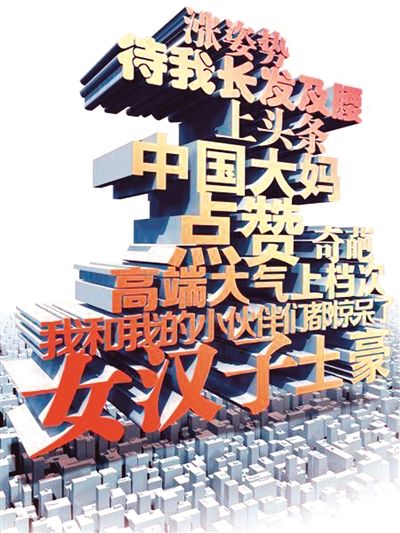現(xiàn)在繼續(xù)播報(bào)新聞。
The Chinese phrase "nihao" is familiar to foreigners greeting Chinese. A new buzzword "tuhao" is now becoming known to many Westerners.
中文短語(yǔ)“你好”是外國(guó)人熟知的中文問候用語(yǔ)。現(xiàn)在許多西方人認(rèn)識(shí)了“土豪”這個(gè)新的流行詞語(yǔ)。
A BBC online news magazine loosely translated "tuhao" to "nouveau riche" and reported that there have been more than 100 million uses of the word on social media since early September.
一家BBC在線新聞雜志粗略地將“土豪”翻譯成“暴發(fā)戶”,并報(bào)道稱自九月初以來(lái)該詞在社交媒體上的使用量已經(jīng)超過1億次。
Literally, in Chinese, "tu" means uncultured and "hao" means wealth. In fact, "tuhao" is an old word originally referring to rural landlords who bullied their tenants or servants. A well-known slogan "overthrow tuhao and divide up their land" was quite popular during the Agrarian Revolution in the mid of the 20th century.
如果按中文字面意思來(lái)理解,“土”指沒有文化,而“豪”指富有。實(shí)際上“土豪”是個(gè)舊詞,原意指欺凌佃戶或仆人的鄉(xiāng)下地主。“打土豪,分田地”這句口號(hào)在20世紀(jì)中期土地革命時(shí)期非常流行。
The old-fashioned term is gaining popularity again. For example, Apple's newly released champagne-colored iPhone 5s, which received unexpected welcome in China, is dubbed "tuhao" golden.
這一舊時(shí)詞匯再次流行起來(lái)。舉例來(lái)說(shuō),蘋果最新發(fā)布的香檳色iPhone 5s在中國(guó)受到意想不到的歡迎,并得名“土豪金”。
We will continue to talk about Chinese buzzwords. They have made it into major English dictionaries in the past, such as "guanxi" and "taikonaut".
我們繼續(xù)來(lái)談中國(guó)流行詞匯。“關(guān)系”和“中國(guó)宇航員”等詞匯曾入選主要英語(yǔ)詞典。
Zhang Yiwu, professor at Peking University, says that before reform and opening up, some Chinese buzzwords which reflect characteristics of the Chinese society were material for foreign experts doing research on China.
北京大學(xué)教授張頤武表示,在改革開放以前,一些反映中國(guó)社會(huì)特質(zhì)的中文流行詞匯曾是外國(guó)專家用來(lái)研究中國(guó)的材料。
He points out that with frequent exchanges and close relations between China and the West in various fields, more hot words in China would become known by the public of the West through media and the Internet.
他指出,中國(guó)和西方國(guó)家在各個(gè)領(lǐng)域交往頻繁、關(guān)系密切,西方人將通過媒體和網(wǎng)絡(luò)認(rèn)知越來(lái)越多的中國(guó)熱詞。
"Tuhao," nevertheless, is not the only Chinese word to appear in mainstream Western media.
當(dāng)然,“土豪”并不是唯一出現(xiàn)在西方主流媒體的中國(guó)熱詞。
A Wall Street Journal article in August used the term "dama," literally akin to "big mama" in Chinese. It refers to those "bargain hunting" middle-aged Chinese women who "keep a tight grip on the family purse and an eagle eye on the gold prices in jewelry shops."
《華爾街日?qǐng)?bào)》八月份發(fā)表的一篇文章中使用了“大媽”這個(gè)詞,中文字面意思與“大媽”類似。指那些各處淘便宜貨的中國(guó)中年婦女,她們往往牢牢掌控著家里的財(cái)政大權(quán)而且嚴(yán)密注視著珠寶店里的金價(jià)。
Julie Kleeman, project manager of Bilingual Dictionaries with the Oxford University Press, says as more Chinese words attract attention among speakers of English, it will provide the West with more windows on China, its culture, and concerns. But whether or not these words will truly form part of English usage remains to be seen.
牛津大學(xué)出版社雙語(yǔ)詞典項(xiàng)目經(jīng)理朱莉·克里曼表示,現(xiàn)在有越來(lái)越多的中文詞匯吸引著英語(yǔ)為母語(yǔ)的人,所以他們將為西方提供了解中國(guó)的窗口,介紹中國(guó)的文化和關(guān)心的事物。不過這些詞匯是否能成為英語(yǔ)用法的一部分還有待觀察。
Prof. Zhang Yiwu from Peking University advocates an open mind towards Chinese buzzwords gaining popularity in the West. He emphasizes that these terms reflected a true situation in the Chinese society, which would better benefit cultural communication between China and the West.
北京大學(xué)教授張頤武主張對(duì)中文熱詞在西方流行持開放態(tài)度。他強(qiáng)調(diào)稱,這些詞匯反映了中國(guó)社會(huì)的實(shí)際情況,這有助于中國(guó)和西方的文化交流。
This is NEWS Plus Special English.
這里是NEWS Plus慢速英語(yǔ)。

譯文屬可可英語(yǔ)原創(chuàng),未經(jīng)允許,不得轉(zhuǎn)載


